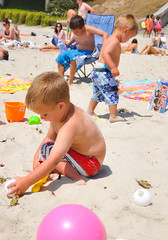 Image by jackiembarr via Flickr
Image by jackiembarr via FlickrWhile we might remember the long, hazy days of summer holiday - endless sunshine and play, are long holidays or indeed long terms good for both pupils and parents? Are parents tearing their hair out by the end of a two-month summer holiday?
Frequent breaks are to be recommended. They're good for enabling us to concentrate and be more productive in the working world. Would pupils benefit from shorter terms and more frequent breaks?
Working parents frequently have to compete for time off at peak holiday time - particularly the question of who's going to work over Christmas and who gets first pick for the Summer holiday time. After all, few companies can afford to have more than one or two members of staff off at any one time.
Does it make more sense to do something different with the academic year? Universities have shorter terms and build in study and research weeks.
Long summer holidays put pressure on working mums to find alternate child-care or take time off work to spend with their children (not a bad thing obviously) but dictated by school terms and of course the increase in cost for anything at peak holiday time.
Hard working teachers probably benefit from the long summer break just as much as the over-worked, exam-stressed pupils. But would more frequent breaks benefit them both?
Exams also tend to fall during the peak time for both heat and hayfever. While conditions may have improved - I'm sure many pupils still suffer sweltering on hot summer days and struggling their exams with snuffles, sneezing and streaming eyes and noses.
Related articles:
- Half-term costs parents £400 keeping kids entertained (telegraph.co.uk)
- End of term. Already? (bbc.co.uk)


No comments:
Post a Comment